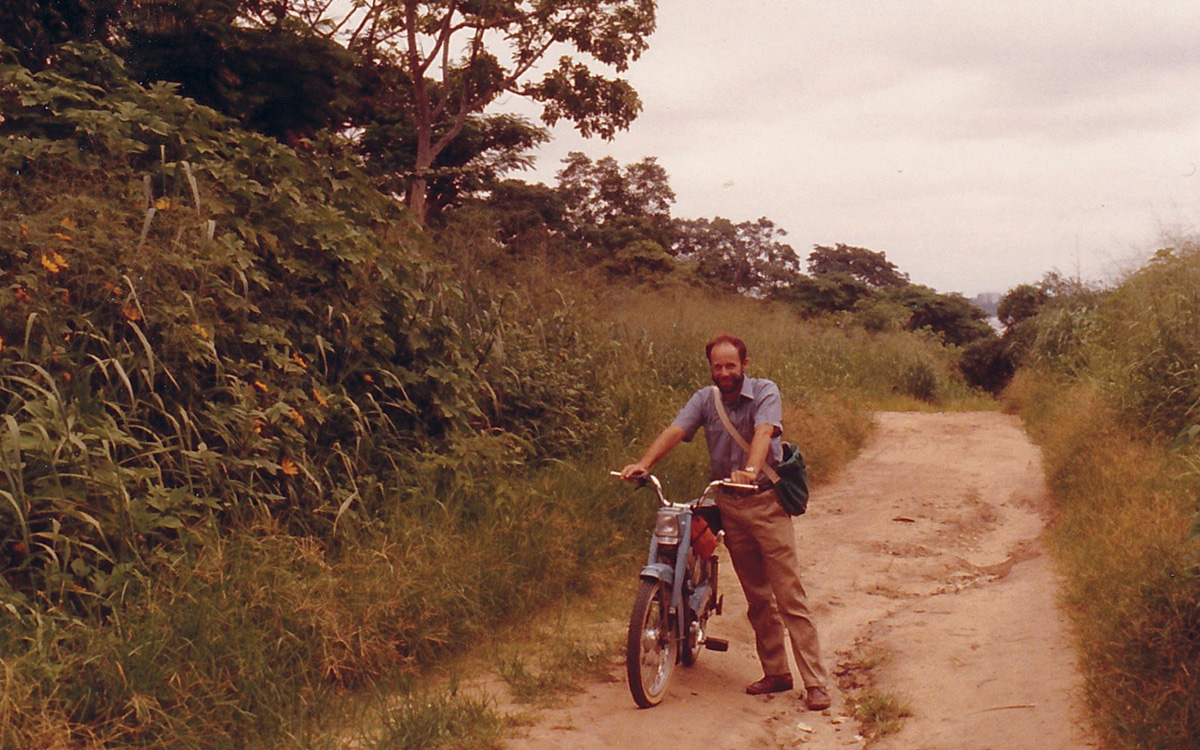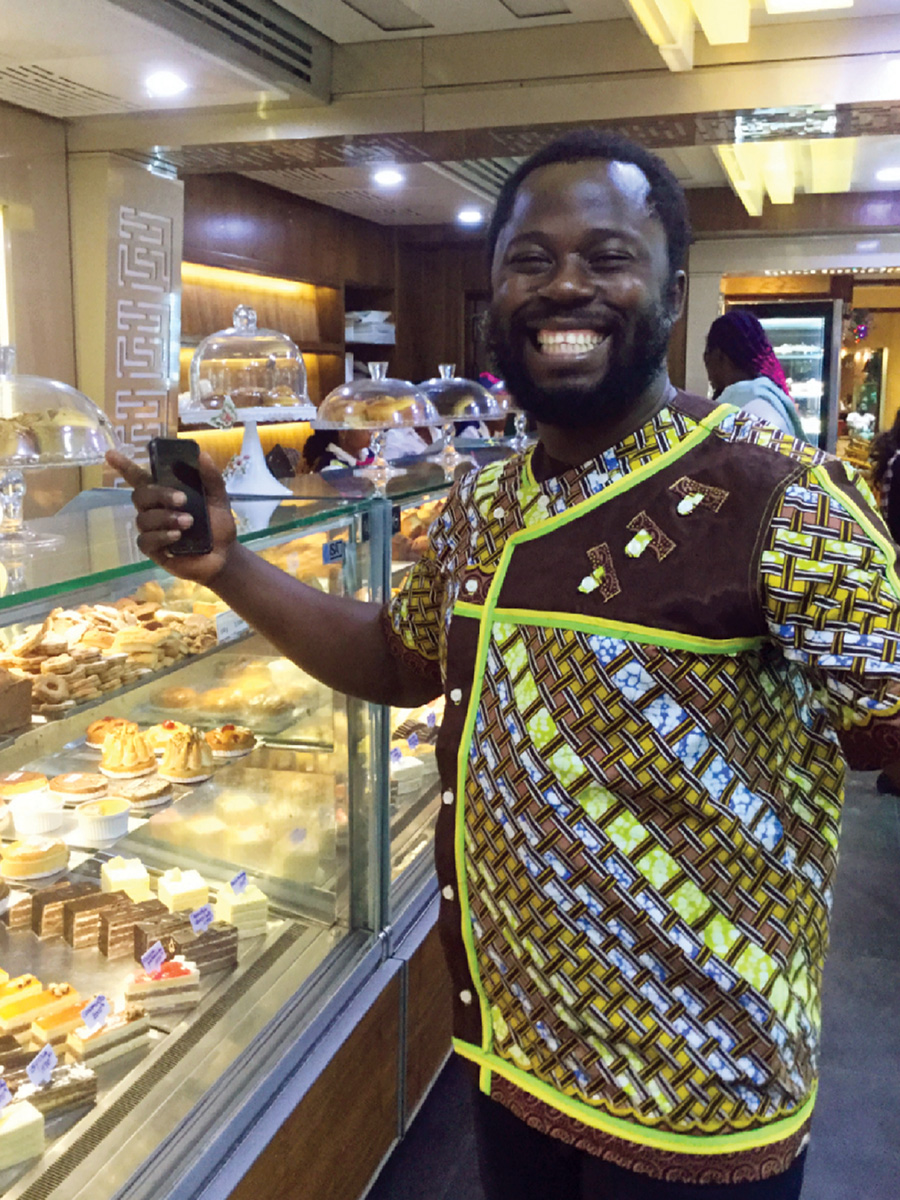Back to Brazzaville
Reflections
BY DAN WHITMAN

The author and his motorbike in Brazzaville, the capital of the Republic of the Congo, 1980. The Congo River is visible in the far background.
Courtesy of Dan Whitman
July 19, 2018. It’s been 38 years since I’ve been to Brazzaville. Still three degrees south of the equator, but now unrecognizable. This time there was air conditioning, isolation from the outside, but also the loss of the smells and rhythms from before.
Gone, the sweetish smell of burning garbage and the mangy thoroughbred dogs left behind by French aid workers and professors as they departed for their summer vacations in France. Gone also, the dirt thoroughfares and the banging of metal on metal: the developing world sounds of people fixing things. Now even poor people just replaced their old, broken cooking pots with new, cheap ones, courtesy of the Chinese.
Not exactly Schliemann’s Troy, Brazzaville didn’t have much underneath; the old buildings were now dust from decades of civil war and urban renewal. Before the changes, it had seemed more a village than a city.
I was drafting schedules and funding requests in my embassy office. At first, I didn’t notice the stranger standing there, but I looked up when he said something. He didn’t seem like embassy staff, but security wouldn’t have let him in otherwise. He was about my age, maybe a little younger. Dressed in a simple, flowing local shirt and worn pants, frayed shoes, his African hair half-gray.
“When I saw you in the hallway last week,” he said, “I had the impression I’d seen you before. Is it possible you lived here in about 1980?”
Taken aback, I dropped my pen and offered him a seat. I got up from behind the desk and took the chair next to him.
“Were you at Marien Ngouabi University at that time?” he said. “You look familiar, though naturally a little changed.”
“I was there, yes,” I said, a little suspicious. “Are you saying you were one of my students back then?”
“No, but I think I remember you from the campus.”
“I haven’t found anything here I recognize from before,” I said as I tried to read his expression. “Do you know the little neighborhood where the profs used to live?”
“I do. Opposite the Marché Filbert Bourou, off the Avenue Simon Kimbangou.”
I processed the moment. “Can you take me there if I get a car? Maybe Saturday?”
“Avec plaisir,” Michel said. He was a grounds manager at the embassy.
It seemed the new Brazzaville had pulled up its socks and was eager to join a wider world, held back only by airfare, visas and enough reading material to meet its wishes.
Back in 1980 I had lived in modest digs in an academic ghetto, with an Iranian, Brits, French, an Italian, Soviets and a Laotian as my neighbors. All taught at the university named after martyr Marien Ngouabi, the president killed in 1977; he had served as a national figure in a country slighted by history in being given its independence, rather than “winning” it.
Neighbors who’d been there longer than I had disdainfully called the university “le lycée,” since its standards were not, shall we say, up to the Grandes Écoles in France. A Fulbright grant had me teaching English there, and I did my best at it.
After a year and a half, I took away lively memories. They come to me now as tableaux vivants:
• Sunsets over the river, beer in hand, as the sky darkened at dusk. A hundred thousand vampire bats filled the sky, lifting off from their day jobs on the Île du Diable in the middle of the river, to the mainland where they would find cattle to feed on at night.
• Flan and coffee under the arcades of a colonial French marketplace. A child approaches and says, “J’ai faim.” I offer a spoon and a seat at my table; frightened, he runs away.
• Community security guard Gabriel cooks maboke—or vegetables and savory fish slowly roasted in palm leaves over an open-pit fire.
• Afternoon run; amazed children laugh and point, “Moundêlê! Moundêlê [weird foreigner]!”
• Shower out of a blue bucket. Two gallons, plenty.
• Geckos stage acrobatics on the wall. Better than Cirque du Soleil.
• A tarantula, big as a freight car, scuttles under my refrigerator to the cool shadows below.

Embassy Brazzaville Locally Employed Staff Member Lejuste Moukoubouka at a local French pastry shop in downtown Brazzaville, 2018.
Courtesy of Dan Whitman
Now, in 2018, I was working a temporary job at the new U.S. embassy. The only building I recognized from before was Blanche Gomez Maternity Clinic, built by the Chinese in the late 1970s, when China’s per capita GDP was onethird that of the Republic of the Congo. For lack of running water, the clinic was never used, and still stood empty.
A new corniche led from Brazzaville’s center to the Case de Gaulle, where the leader of the Free French had held the Brazzaville conference of 1944. It was now the French ambassador’s residence. Built by the government of France, the corniche connected to a bridge to nowhere—aesthetically eyepopping, donated by a newly prosperous China.
The dour Congolese from before seemed gone. Gracious, quick to laughter and easy to deal with, the “new Congolese” seemed to be on social media, able to access some personal funds. Even a Brooks Brothers outlet opened with fanfare during the second week of July.
It seemed counterintuitive that this store could have a clientele in a poor country of four million (doubled from the 1980s), but Congolese assured me it would. “When they have any money at all, they spend it on clothes,” an embassy driver told me.
Michel, the stranger in my office, took me out to the city that Saturday. We saw the Brazzaville crafts market, where you get no hassles, no pressure to buy, and an open and relaxed atmosphere.
“Make an offer on anything in the store,” one stand owner said.
“What I value most here is you,” I said.
“You can’t afford me—I eat too much,” answered the stand owner.
It seemed the new Brazzaville had pulled up its socks and was eager to join a wider world, held back only by airfare, visas and enough reading material to meet its wishes. Michel and I scoured the city, discovering much that was new and nothing much from before.
In 38 years, the country had gone through travails and traumas. Corrupting oil deposits abetted factional and regional disputes. North-versus-south edginess came to a head in 1992, with northerner Denis Sassou-Nguesso displaced in elections by southerner, anti-Marxist Pascal Lissouba. Lissouba quarreled with runnerup Bernard Kolélas, and fights broke out.
Now I see that the new “Little” Congo hovers like a sting ray over a murky past. The civil war of 1997-1998, politically inspired and with ethnic overtones, took a steep toll. These days a teachers’ strike shuttered the university, as professors went without pay for five months. As the market price of oil dropped, so did single-product Congolese exports and, with those, the local economy. Asked why teachers weren’t being paid, the government said it had “other priorities.”
Congo-Brazzaville has a long road ahead before realizing its potential. Connected, savvy and determined, its youth and an emerging entrepreneurial class may carry it forward—and certainly out of the doldrums from four decades earlier—or, failing that, get out and live somewhere else.
It’s best for all if they manage to make it at home, and maybe they will.




